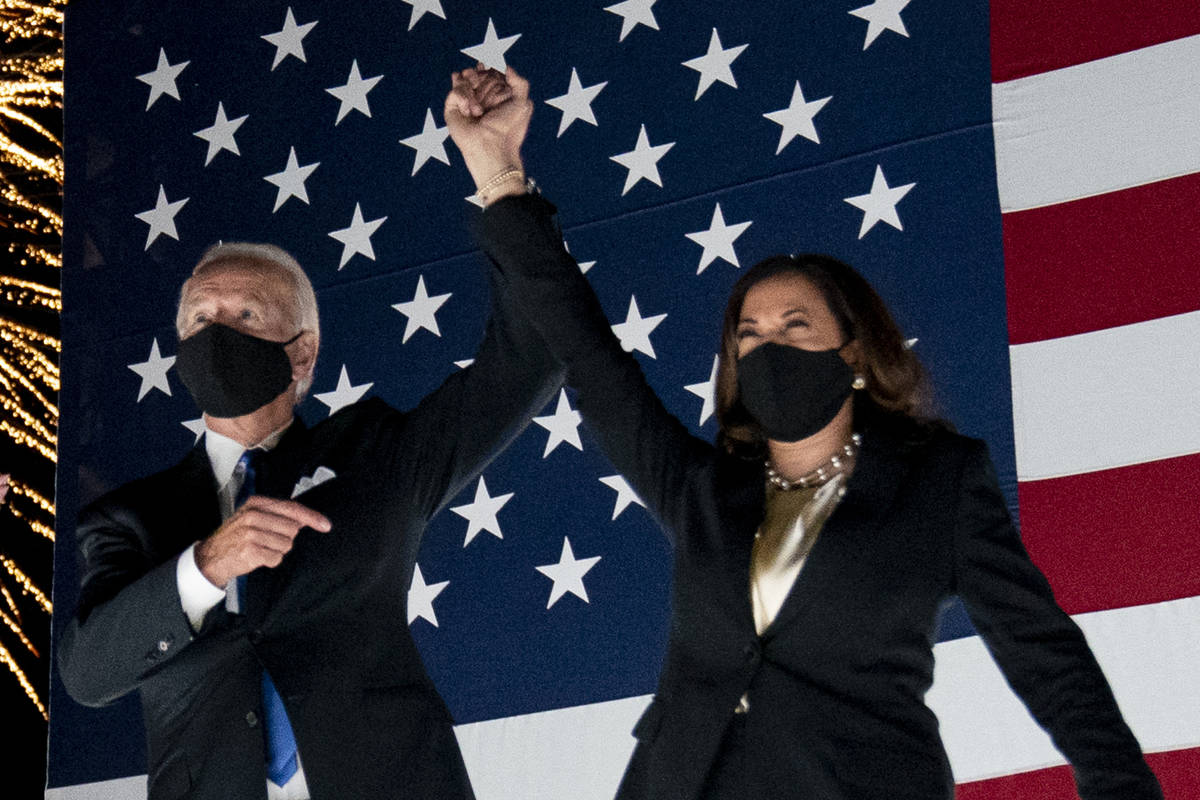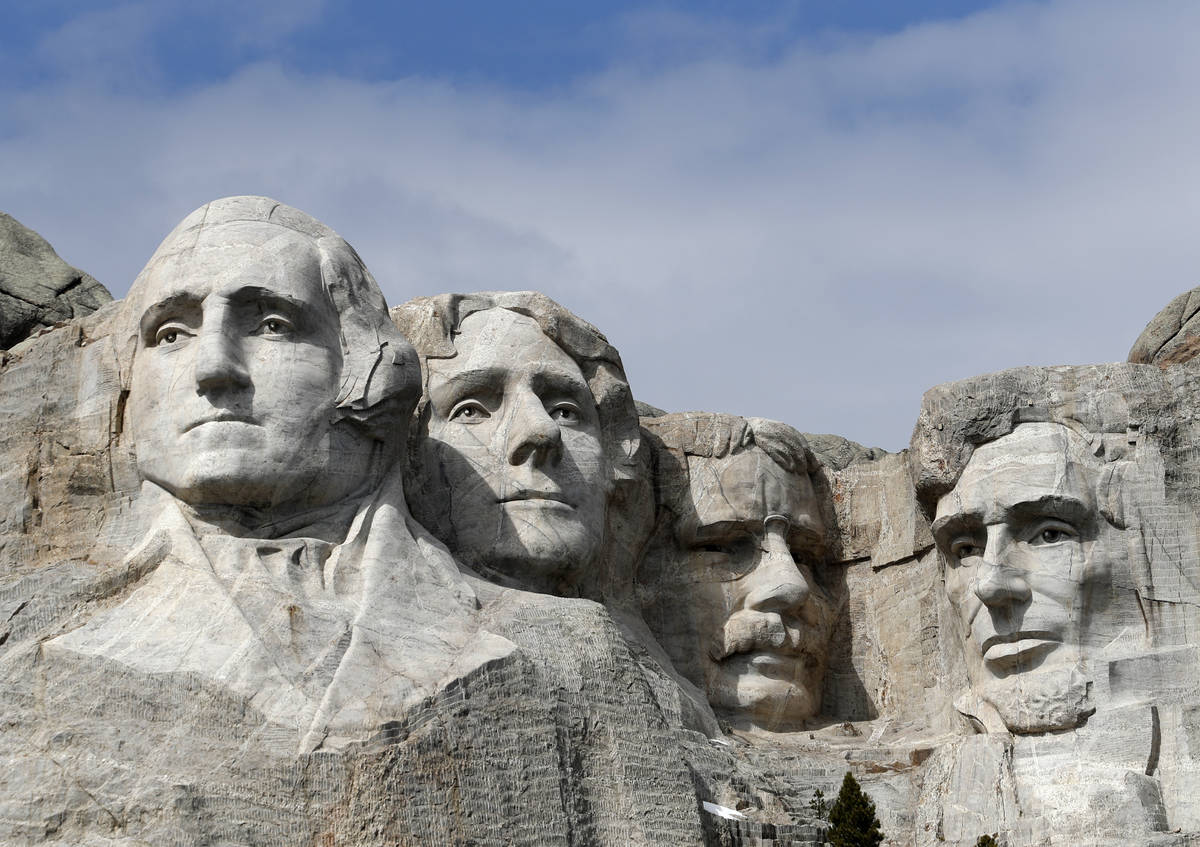Is Senate service now required for spot on Democratic presidential ticket?
WASHINGTON — Four former presidents representing historic national milestones grace the top of Mount Rushmore National Memorial — George Washington, Thomas Jefferson, Theodore Roosevelt and Abraham Lincoln.
None of them ever served in the U.S. Senate.
But during the past half-century, senators have used the legislative chamber as a launching pad for presidential bids.
Most sputtered and failed. Many have captured party nominations. Just more than a dozen were successful and later sat in the Oval Office.
Why do so many members of the Senate run?
Political scientists and strategists said there is very little downside to making a presidential bid. Even a loss can raise national exposure and boost a re-election bid or position a lawmaker for a Cabinet-level position.
And the attention senators already receive with expanded cable television coverage and social media platforms provide name recognition that can convince any legislator that he or she can run the country.
“Just about every senator I have ever known — with the exception of Sen. (Harry) Reid (D-Nev.)— thought that he or she could be the next president of the United States,” chuckled Jim Manley, a political strategist who worked decades on Capitol Hill.
Manley was a spokesman for Reid and worked for Ted Kennedy of Massachusetts, who made a presidential run in 1980.
Lots of candidates
During his long tenure on Capitol Hill, Manley has seen up close senators who have jumped into presidential races and some that probably should not have.
Like the late Sen. Paul Wellstone, D-Minn., who formed an exploratory committee in 2000. He never declared himself a candidate after campaigning in early states, failed to gin up support and then suffered an injury and bowed out.
Sen. Joe Lieberman also slunk out of the Democratic presidential race with less than enthusiastic support in Iowa and New Hampshire.
There was an old joke, back when the Senate was dominated by men, that every morning “when a senator shaves, he sees a president looking back,” recalled Kevin McMahon, a political science professor at Trinity College in Hartford, Connecticut.
Sometimes lawmakers make the crucial decision based on where they are in life and in their political career, knowing the window of opportunity narrows.
“You’ve got to pick your moment,” McMahon said.
The last Democratic race for the presidential nomination proved that ambitions are not restricted to age or gender. And winning a party nomination and carrying it through to the White House remains an uphill path with many hurdles.
To date, only 16 of 45 presidents were senators who later served in the Oval Office.
Just three, Barack Obama, John F. Kennedy and Warren G. Harding, moved directly from the Senate to the White House, according to records kept by the U.S. Senate.
If elected, Joe Biden, the Democratic presidential nominee, would follow the Senate path to 1600 Pennsylvania Ave. But like many before him, it would follow a term as vice president or another office.
A surfeit of senators
Biden selected former primary rival Sen. Kamala Harris of California to be his running mate.
Harris, if she’s elected, would become the first Black woman to serve as vice president, and she would be the first senator from a state west of Texas to be vice president, noted Rep. Dina Titus, D-Nev.
Titus was the first congressional member from one of the first four primary and caucus states — Iowa, New Hampshire, Nevada and South Carolina — to endorse Biden.
But Biden could have selected from other Democratic primary rivals who also serve in the Senate: Cory Booker of New Jersey, Kirsten Gillibrand of New York, Elizabeth Warren of Massachusetts, Amy Klobuchar of Minnesota, Michael Bennet of Colorado and Bernie Sanders of Vermont.
On the Republican side, President Donald Trump is an anomaly. He’s the only candidate in American history elected to the presidency without prior political or military experience.
Perhaps fittingly, Trump held a photo op at Mount Rushmore this year. Although various media reports said Trump inquired about adding his bust to the monument, he has denied that when questioned in public.
Other recent presidents, George W. Bush, Bill Clinton, Ronald Reagan and Jimmy Carter were governors who used their executive experience as a steppingstone to the White House.
President George H.W. Bush served as a CIA director, U.N. ambassador and a congressman before being selected by Reagan as a running mate and later winning the White House.
In 2016, the GOP field included Sens. Ted Cruz of Texas, Rand Paul of Kentucky, Marco Rubio of Florida, Lindsey Graham of South Carolina and former Sen. Rick Santorum of Pennsylvania. Hillary Clinton, a former senator and secretary of state, defeated Sanders in a blistering Democratic race four years ago.
Clinton picked Sen. Tim Kaine of Virginia as a running mate. Trump picked former Indiana Gov. Mike Pence, who also previously served as a congressman.
Senators have the chops
Sen. Jacky Rosen, D-Nev., said selection of a senator as a running mate makes sense.
A vice president also serves as president of the Senate, casting tie-breaking votes when needed and heading the administration’s legislative agenda in Congress.
Rosen, a former House member, said as a senator she serves on five committees and 10 subcommittees. In addition to serving Nevada, she said must weigh national and global concerns.
“When you are in the Senate, you represent your state, have a national view and also an international perspective,” Rosen said.
The Senate springboard to the presidency is a phenomenon that follows the advent of television, Manley said, noting that John F. Kennedy used the medium to catapult him to the White House and best Richard Nixon in 1960 televised debates.
An increase in multiple social media platforms and cable television provide senators with more opportunity and exposure today.
“Senators have higher name recognition, a large fundraising base and the ability to command more public attention than most politicians,” Manley said.
Manley said in more than 20 years, the only senator he knew that didn’t aspire to the presidency was Reid, who rose to become Senate majority leader, a powerful position in its own right.
“He was smart enough to realize his skills were best left in the Senate,” Manley said of his former boss.
Although the odds of winning the presidency as a senator remain slim, there is really no downside. A presidential run opens up national media opportunities to carry a message, or showcase one’s qualifications.
None of the 2016 GOP candidates was selected by Trump for Cabinet-level positions. And it is hard to say whether Graham benefited from his presidential bid in securing the top spot on the Senate Judiciary Committee, a position largely determined by seniority.
But Clinton, after her losing battle to Obama, was picked to serve as secretary of state after eight years in the Senate.
Sen. Lloyd Bentsen of Texas, the Senate Finance Committee chairman, was tapped by Bill Clinton to serve as Treasury secretary after a failed presidential run by the longtime Texas lawmaker.
“It’s sort of a natural progression for a senator to think he or she could run,” McMahon said, “and the other thing to consider is that they are safe.”
Senate terms last for six years, and often senators can run for higher office without giving up their seats.
In the case of Rubio in 2016, he stepped down to run for the White House, but once he was out of the presidential race, he again became a candidate for Senate and won re-election to his seat.
“There is that stability that, even if I lose, I’m still in the game,” McMahon said.
Governors, on the other hand, usually face term limits, which may force a decision to go for the brass ring.
The success of Trump, running and winning the White House without previous legislative or governing experience, could prompt candidates with other backgrounds to seek the presidency.
“He’s opened the door for others,” McMahon said. “I think we will get a more diverse set of candidates on both sides, with more diverse backgrounds.”
Contact Gary Martin at gmartin@reviewjournal.com or 202-662-7390. Follow @garymartindc on Twitter.
























